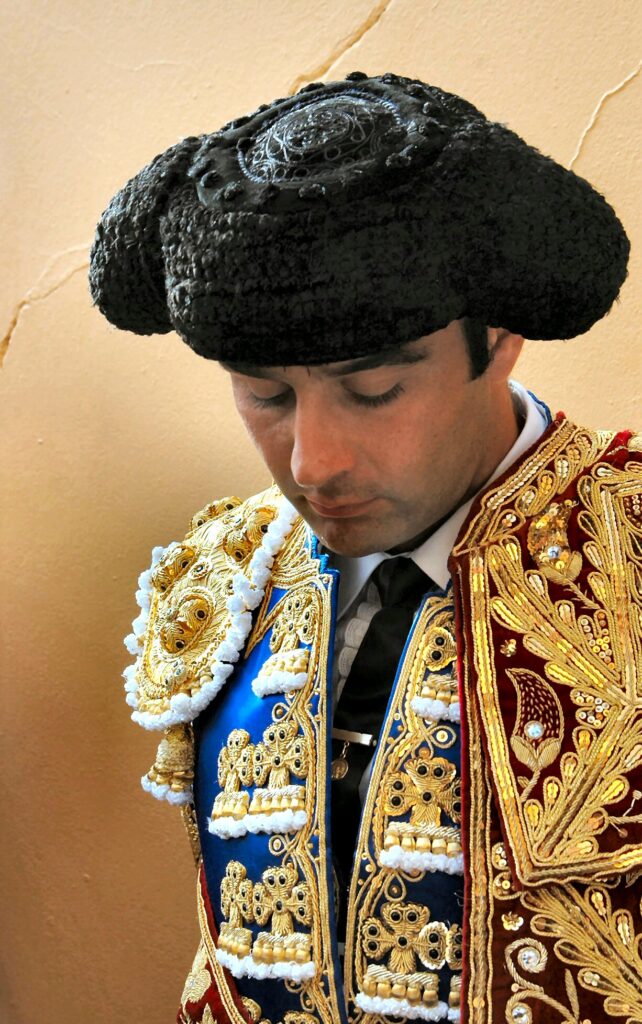
Enrique Ponce, in his traje de luces (suit of lights)
Matches, made in Hell
Carmen, an opera in four acts, music composed by Georges Bizet, libretto by Henri Meilhac and Ludovic Halévy, new production by Opera Holland Park, directed by Cecilia Stinton, City of London Sinfonia and Opera Holland Park Chorus conducted by Lee Reynolds, 14th June 2022, reviewed by Leslie Jones
Carmen is an example of opéra comique, a musical genre in which numbers were inserted into a spoken libretto. Sections of the text, drawn from Prosper Mérimée’s novella Carmen (1845), accordingly, are recited not sung. Acting, as well as singing, was at a premium in opéra comique. The question “can you dance” was as important as “can you sing and act” (See Carmen Review – Dance of Death, Quarterly Review, November 2018).
In Mérimée’s novella Carmen, the story is told from the perspective of besotted soldier Don José. He recalls that Carmen “walked, swaying her hips like a filly from a Cordoba stud farm”. But in Bizet’s opera, it is told from that of Carmen herself. Carmen (Kezia Bienek) considers herself a free spirit, confiding that she has “suitors by the dozen”. Love, she observes in the Habanera, Act I, is “un oiseau rebelle” (“a rebellious bird that no one can tame”), an “enfant de bohème il n’a jamais connu de loi” (“a gypsy child that has never heard of law”). The premiere of Carmen on 3 March 1875 was consequently received as “a gross assault on the senses and sensibilities of an audience accustomed to submissive heroines…” (Official Programme, ‘Introducing Carmen’). When librettists Henri Meilhac and Ludovic Halévy presented their plans to the directors of the Opéra-Comique, one of the latter, Adolphe de Leuven, pointedly interjected,
Carmen? Mérimées Carmen? Isn’t it her who’s killed by her lover? And among thieves, gypsies and cigar-girls? At the Opéra-Comique, the family opera, the theatre for marriage interviews!…You’ll drive the public away…it’s impossible!
Don José (tenor Oliver Johnson), in contrast to Carmen, is a weak willed individual, torn between his passion for her and a code of honour which entails loyalty to regiment and to family, in particular to his ailing mother. After a faltering start in the first act, Johnson was genuinely moving in the second, when telling Carmen how the flower that she threw him outside the tobacco factory “sustained his love during the long weeks in prison” (Official Programme, ‘Synopsis’). If you can move the audience as he did, all else is forgiveable.
Mezzo-soprano Kezia Bienek makes some dubious, “me-too” comments about femicide and feminism in the Official Programme. Feminism, she avers, “is intersectional…Gender, race and class are all at play in this piece”. “Carmen”, she opines, “needs to be told by a woman”. She looks forward to working with a female director “on any project”. So to summarise, misandry, unlike racism and misogyny, is currently acceptable.
Carmen, needless to say, is brilliantly orchestrated, as befits the creator of the scintillating Symphony in C, composed when Bizet was 17 and still regularly performed today. The orchestral interlude prior to Act III is particularly beautiful. And the chorus is compelling, as in the soldier’s refrain “drôles de gens que ces gens-la!”
Dr Leslie Jones is the Editor of Quarterly Review











“Gender, race, class”, “Race, gender, class”, “Class, race, gender,”…. An entire culture dissolves into Orwellian “Duckspeak”.